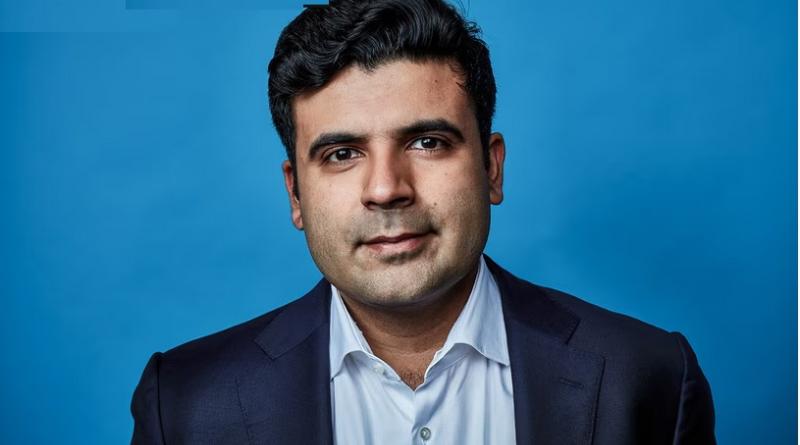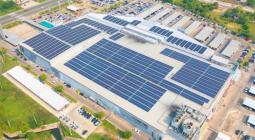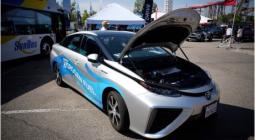‘Electricity is fundamental to quality of life’: the man bringing off-grid, pay-as-you-go power to Africa

Mansoor Hamayun, the co-founder and chief executive of Bboxx, started out with a university project to bring solar power to a few villages in Rwanda. Now he is set to expand tenfold across sub-Saharan Africa
In the next four years, British entrepreneur Mansoor Hamayun expects to connect 36 million people to an electricity source, many for the first time. It is an ambition that would see his clean energy company, Bboxx, expand its reach tenfold across sub-Saharan Africa.
The London-headquartered company has grown from an idealistic startup with hopes of transforming the lives of African households to a company offering pay-as-you-go solar power, batteries, smartphones and electric motorbikes to about 3.6 million people across Africa in little more than a decade. Now, a $100m (£78m) investment from EnerTech, a Kuwait-based investor, is about to spur its fastest growth yet.
“Bboxx will turbocharge the impact we have on communities across sub-Saharan Africa,” Hamayun says. “Our shared vision is to transform the lives and livelihoods of our customers by giving them access to clean and affordable energy, clean cooking, e-mobility and technology like smartphones, that genuinely unlock their potential, day by day.”
Bboxx was founded by Hamayun and two university friends – Christopher Baker-Brian and Laurent Van Houcke – to gain a foothold in the enormous untapped energy potential that the African market represents. It is one of a growing number of companies pioneering a new approach to energy supply: off-grid and pay-as-you-go.
Hamayun’s story began about 15 years ago with 60 households in Rwanda. Over the course of a summer, while studying at Imperial College London, he set up a charity that provided six villages with solar electricity for the first time. The project continues to generate power to this day.
The project began as an “academic challenge”, he says. At the time about 1.6 billion people globally were without access to reliable sources of electricity – and these numbers threatened to spiral as population growth outpaced progress on the world’s sustainable development goals.
Since then, the number of people living without access to electricity across Asia’s developing economies has plunged, while Africa has remained largely in the dark. About 570 million people on the continent do not have access to electricity, and another 840 million are connected to an unreliable grid.
“Africa is the biggest unserved consumer market on earth,” says Hamayun. Bboxx offers simple solar and battery systems which can provide light and power to homes that have no access to a stable electricity grid. The company also offers clean cookers, electric water pumps, smartphones and electric motorbikes.
The impact is often profound. Access to reliable electricity can provide the power to open small businesses, educate children and safeguard the ill or vulnerable. “It’s transformational,” Hamayun says.
“Electricity is so fundamental to ensuring an acceptable quality of life. I met a customer in Kenya last year who was extremely proud that her daughter had just been accepted to a medical university. She said the ability to have lights continuously at home helped tremendously in educating her children. They worked so hard, but the fact that we contributed a little bit towards that outcome … well, it’s incredibly motivating for all of us.”
A customer in Rwanda recently praised Bboxx for increasing the amount of milk his cow was able to produce. “And I couldn’t work out how we had influenced this man’s cow,” he laughs. “He explained that thanks to the electricity he was able to run a water pump for the first time; and more water for the cow means more milk. In hindsight, it all makes total sense.” The story has stayed with Hamayun as a reminder of the myriad, unexpected ways that electricity can alter the lives of those who access it for the first time.
The Bboxx business model hinges on Africa’s telecoms boom and the widespread adoption of “mobile money” banking, which has made pay-as-you-go an accessible option for millions of people who could not afford a longterm pay-monthly contract.
“People might not be able to pay $30 a month for a service, but they can afford to pay $1 a day. Yet a lot of service-based offerings still call for monthly billing. It’s a very western way of thinking.”
Switching from kerosene lamps and stoves to solar power and clean cookers is often cheaper, too, says Hamayun. “People don’t realise it’s expensive to be poor in Africa. A lot of goods are more expensive there than in the UK. We’re offering a cheaper option on better terms.”
Hamayun says Bboxx’s rivalry with similar companies is not in the battle for potential customers, but in the area of recruitment. “Where competition is fierce is in finding capital and talent,” he says. “There is a limited pool of money, which is smaller than what the size of the market requires.”
Bboxx has the backing of Japanese utility giant Mitsubishi and France’s Engie, and has secured regional partnerships with major western energy companies including EDF to help increase their reach across the continent. For these major utilities Africa provides a testbed for a new, digital data-led energy system still in its infancy in the developed world. Already, the continent is “leapfrogging” the need for centralised fossil fuel power plants and costly grid systems by leaning on renewables and data, Hamayun says.
“There really are no limits to the scale that you can grow in this market. Take Nigeria: it has a population of about 228 million people, but this is forecast to grow to 400 million by 2050. Already, its power grid is extremely unreliable, so the size of the challenge is enormous. But at the same time, it is a country with a young population that has the ability to change and adapt to new technology.
“You have all of these factors at play at the same time, which makes Africa very exciting.”
CV
Age 35
Family Married with a “kid on the way” Education Masters of engineering, electrical and electronic engineering from Imperial College London
Pay £300k + “other typical CEO stuff”
Biggest career mistake “Not focusing on the culture of the business from Day Zero and maintaining it throughout”
Best advice he has been given There is no shortcut to hard work
Overused phrase Make the impossible, possible
What he does to relax Socialising in all its forms. And chess
Cover photo: Mansoor Hamayun, co-founder and chief executive of Bboxx. Photograph: John Godwin/Handout






